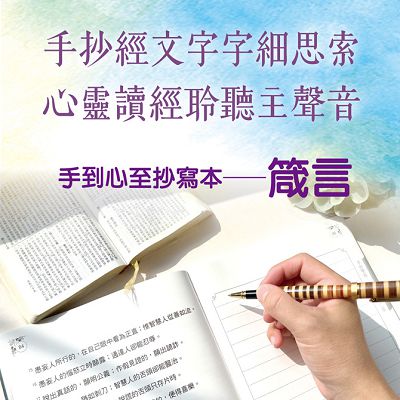|
Taiwan Church News 3047 Edition July 19~July 25, 2010
Editorial: Penning our legacy
Translated by Lydia Ma
In this ever-changing society, a lot of news and information come and go much faster than our ability to keep up with them. Though we have a lot of technology on hand to capture them, we are also well aware that every mean we employ is quickly replaced by a better one within a few years.
In the end, all efforts in preserving information with the latest technology may prove to be useless years down the road. It is then that we realize simple words may turn out to be the best way of preserving our legacies after all.
In this age of mass media communications and advanced technologies, many people may be led to think that writing or print media will eventually be replaced by newer means of communication and written words will therefore lose their power over time.
But in retrospect, though television and radio may relay news instantly and offer information with vivid images and powerful sound bites that easily rouse our senses, the audience remains a passive listener whenever they tune in because there’s no interaction with the programmer.
With reading and writing, there is a lot more room for interactions between writers and readers and such interactions can give way to new ideas. Hence, despite technological advances, we’re convinced that writing remains the most powerful and creative tool.
Using the protest staged by farmers on July 17 as illustration, we saw a bulldozer raze through rice paddies in the middle of the night by order of Miaoli County. The whole ordeal was captured on film by media outlets and later incited righteous anger on the part of citizens who sympathized with the plight of rice farmers.
We could say that those images served their purpose in helping the audience understand the collusion and corruption between officials and big corporations in the halls of government and exposed the wickedness of both parties.
But if we fast-forward 10 or 20 years and review those images or clips again, what will the average person then think of them? Not knowing the full story leading up to these images, will people shake their heads, befuddled at what the fuss is all about, and move on? Will they relegate these clips as another piece of history that has nothing to do with their lives?
Let me suggest that if this event had been written down, either in the form of a report or a short-story, readers would get a better sense of these farmers’ plight and the whole picture even if the incident had occurred 20 years before their time.
Written words can usually describe an incident more clearly, go into detail by offering background information, and even provide in-depth analysis at the end. Readers who read an article can draw inspiration from what they’ve read and form new perspectives.
The Bible is the best advocate of the power of written words and it’s the foundation of our Christian faith. Though many people have endeavored to make into film many stories contained in the Bible, this old book has never lost its allure and has continued to serve as a foundation and inspiration for many works of art.
Furthermore, as we read the Bible and reflect again and again on what we’ve read, we are strengthened and encouraged anew. The amount of fresh revelation we find each time we read the Bible is mystifying and that is the why we say God’s words are never-changing and yet always new.
Though PCT has always had communications ministries, we’ve never emphasized on the power of words and we’ve nurtured the habits of reading and writing even less. Without readers, it’s difficult to advance communications ministries. So, let’s focus on promoting reading and writing through penning our legacies in church bulletins, church newspapers such as “Taiwan Church News”, and other Christian publications.
|




